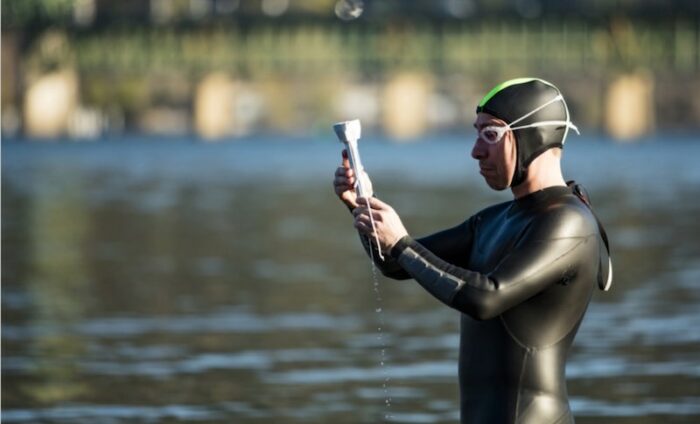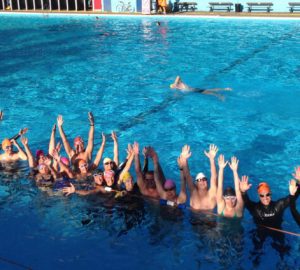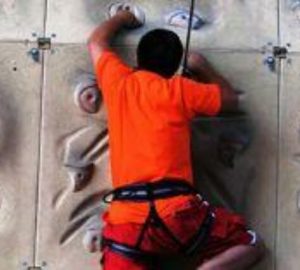
Sport psychology: “What if I can’t cope with the cold?”
Even if you are prepared and acclimatised, the prospect of swimming in cold water can cause worry and panic. Helen Davis explains how to thrill to the chill
Facing an upcoming race or event when temperatures have been plummeting can be psychologically challenging. Perhaps you have been preparing for some time, ensured you have acclimatised to cold temperatures, have a decent wetsuit (if you are wearing one) and feel you know your limits. Yet when the important day arrives you see the weather forecast and know the water is going to be really cold. How can you keep control of your thinking so that worry and panic are not dominating your thoughts? Here are some tips to help you approach the situation in the best possible mindset.
Recognise
Notice the thoughts you have in relation to the water temperature. Are they dominated by worry or concern? Are you asking yourself ‘what if?’ type questions, such as “what if I can’t cope with the cold?” or “what if I can’t manage it?” Recognise that this type of future-thinking can inflame emotions, increase anxiety and is not a helpful line of thinking – unless you have a plan.
Thinking plans
Having a psychological plan will help you feel more in control. Try an ‘if-then’ plan, such as “If I can’t cope with the cold, then I will decide to raise my arm and call over the support boat.” Also, aim to place focus on what you do know, and use self-talk to help. Remind yourself of your planning and preparation and tell yourself you have trained for this moment. This type of thinking is helpful and if-then planning gives you a course of action. This, coupled with good word choices, can help bring control to your thinking.
Watch your language
Having noticed and recognised your thinking, listen to your choice of words. Are the words you choose fuelling your self-belief or fuelling your worries? Choosing language such as, “I can’t stand being in freezing cold water” can provoke and inflame anxiety. Generally speaking, “I can’t stand it” type thinking means we really don’t like it and it is uncomfortable, but we can manage it. We can stand it, it’s just very unpleasant. Using inflammatory language regularly in relation to things we find difficult can lead to anxiety and not wanting to swim at all. Take care with your choice of words, try realistic and positive statements such as, “I find it very difficult swimming in freezing temperatures, but I still want to give it a go.”
What are your motives?
Motivation can fluctuate and perhaps the cold temperatures are the reason you are not swimming at present. For those who want the challenge of swimming in cold water, take time to assess your motives. Are you wanting to do it for fun, because you genuinely think it will be a great thing to try? Or are you wanting to do it because somebody else is telling you it’s great? This might make you feel tempted, but worried about managing the cold. Knowing and learning what drives you can help when you are not feeling motivated. Try and create an environment where you feel supported and check in with people who can help keep you motivated with your goals. Use and draw upon this social support when you are finding it hard. Others might give you the self-confidence and belief you need to give it a try.
Give yourself a boost
When preparing for swimming in very cold water, work hard at boosting your self-confidence at every opportunity. Confident swimmers think they can, and they do, and they never give up. Confident swimmers typically use positive self-talk, visualise positive images and have positive dreams of success. Focusing on successfully mastering the task of swimming in cold temperatures, rather than worrying about performing poorly or the negative consequences of failure is a helpful, positive approach to take. Having an “I can do it” belief is important for any sporting success, and can help swimmers set challenging goals for themselves, like cold water swimming. Seek out sources of confidence, such as past experiences in cold temperatures and remember how you coped. Have a positive ‘cold water buddy’ who can support and help you visualise success.
Visualising success
Visualising yourself being confident, successful and coping with a positive mindset in cold temperatures can be an effective strategy. Mentally rehearsing before entering the water can help increase self-confidence and motivation and reduce feelings of anxiety. Successful athletes use visualisation extensively and systematically as part of their preparation, so give it a try! Imagine yourself walking confidently to the water’s edge, picture yourself entering the water calmly, coping with the temperature and enjoying the experience. Bring in all the senses when you visualise to be the most effective as this will help to create a vivid picture.
Know your limits
Knowing your limits and making decisions regarding your personal safety in cold water is important. Temperatures present challenges in open water swimming environments and knowing you have adequately prepared for the challenge is key to psychological and physical success. Being prepared means you can place your focus on your personal resources to boost you for the challenge, such as confidence and motivation, rather than focusing on worries and concerns. Good luck
Helen Davis is a swimmer and sport psychology consultant who works with individuals, teams and coaches on their sporting performance. Each month, Helen will suggest psychological techniques to help overcome difficult open water swimming scenarios.
@helenDav2245







